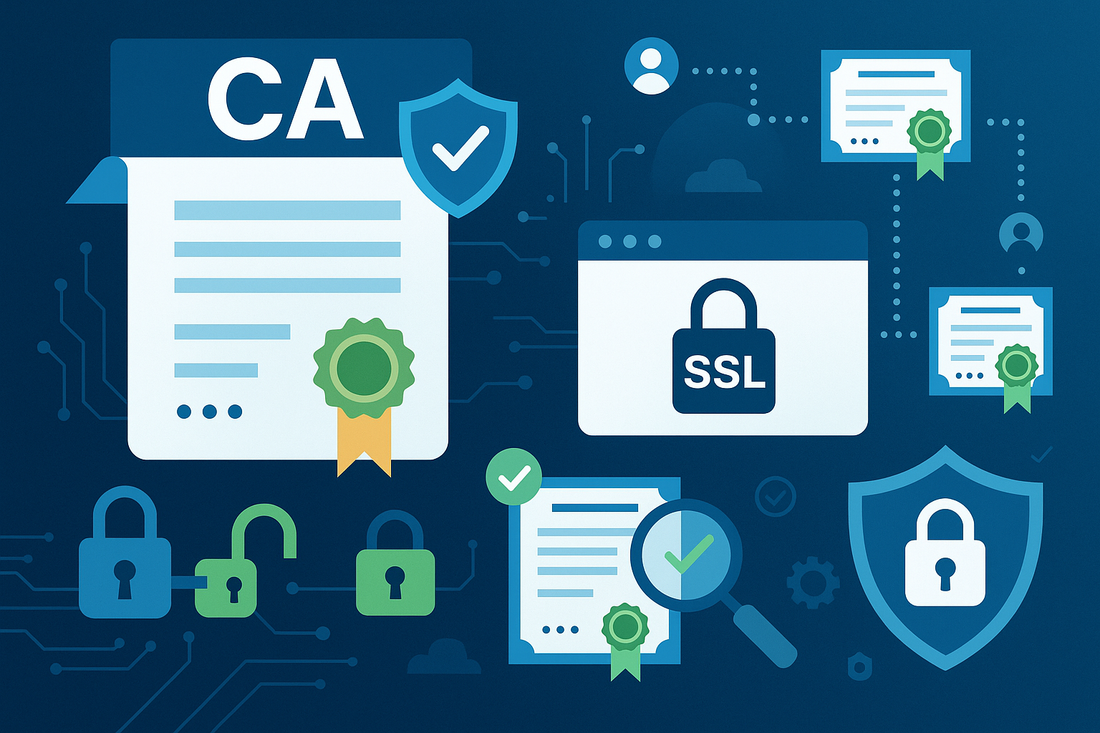
Certificate Authority (CA) Information
Andrew JohnsonShare
Online security has become paramount for businesses and individuals alike. At the heart of internet security lies a crucial component : Certificate Authorities (CAs) and SSL Certificates.
A Certificate Authority (CA) serves as a trusted third-party entity that issues, validates, and manages digital SSL Certificates that secure online communications and verify website identities.
Certificate Authority (CA)
A Certificate Authority (CA) is a specialized organization that acts as a digital notary, verifying the identity of entities requesting SSL Certificates and issuing trusted digital SSL Certificates.
Certificate Authorities (CAs) maintain strict security protocols and undergo regular audits to ensure they meet industry standards for issuing SSL Certificates.
Certificate Authorities (CAs) serve as the backbone of Public Key Infrastructure (PKI), creating a chain of trust that enables secure communications across the internet.
CAs maintain root SSL Certificates trusted by all major browsers and operating systems.
The role of a Certificate Authority (CA) extends beyond simply issuing SSL Certificates and must verify applicant identities through rigorous validation processes, maintain secure infrastructure for SSL Certificate issuance, provide revocation services when SSL Certificates are compromised, and ensure compliance with industry standards and regulations.
The Evolution and Importance of Certificate Authorities (CAs)
The internet was originally designed for open communication without security considerations.
As online commerce and sensitive data transmission became commonplace, the need for secure communications grew exponentially. This evolution led to the development of SSL Certificates and the Certificate Authority system we rely on today.
Modern Certificate Authorities have evolved to meet increasingly sophisticated security requirements.
They implement advanced validation procedures, maintain highly secure infrastructure, and provide comprehensive SSL Certificate management services. Trustico® partners with established CAs to deliver enterprise-grade security for organizations of all sizes.
The importance of Certificate Authorities (CAs) cannot be overstated in today's interconnected world.
Every secure website, e-mail system, and digital application relies on SSL Certificates issued by trusted Certificate Authorities (CAs). Without this trust infrastructure, secure online commerce, banking, and communication would be impossible.
How SSL Certificates Work Within the CA Framework
SSL Certificates function as digital passports that verify website identity and enable encrypted communications.
When a Certificate Authority (CA) issues an SSL Certificate, it creates a cryptographic binding between a Public Key and the verified identity of the SSL Certificate holder. This process ensures visitors can trust they are communicating with the legitimate website owner.
SSL Certificates utilize advanced cryptographic algorithms to provide robust encryption and authentication.
Modern SSL Certificates support the latest TLS protocols and cipher suites, ensuring maximum compatibility and security across all platforms and browsers. The SSL Certificate installation process creates secure channels that protect sensitive data from interception and tampering.
The technical operation of SSL Certificates involves complex cryptographic processes that occur transparently to end users.
When a browser connects to a website secured with SSL Certificates, it verifies the SSL Certificate chain back to a trusted root Certificate Authority, establishes encrypted communication channels, and displays security indicators to confirm the connection is secure.
Types of SSL Certificate Validation
Certificate Authorities (CAs) offer different levels of SSL Certificate validation to meet varying security and business requirements.
Domain Validation (DV) SSL Certificates provide basic encryption with automated domain ownership verification. These SSL Certificates are ideal for personal websites, blogs, and basic business sites requiring fundamental security protection.
Organization Validation (OV) SSL Certificates require more extensive verification processes.
Certificate Authorities (CAs) validate both domain ownership and organizational details. OV SSL Certificates undergo thorough business verification procedures, including company registration verification, physical address confirmation, and authorized representative validation.
Extended Validation (EV) SSL Certificates represent the highest level of SSL Certificate validation.
These SSL Certificates require comprehensive identity verification processes and display enhanced browser indicators, including organization names in the address bar. EV SSL Certificates provide maximum trust indicators for e-commerce sites, financial institutions, and other high-value online services.
The SSL Certificate Issuance Process
The SSL Certificate issuance process begins when an applicant submits a Certificate Signing Request (CSR) to a Certificate Authority.
This CSR contains the Public Key and identifying information that will be included in the SSL Certificate. Certificate Authorities (CAs) then initiate validation procedures appropriate to the requested SSL Certificate type.
Modern issuance processes balance security requirements with operational efficiency.
Automated systems handle routine validation tasks while security experts review complex applications. This approach ensures rapid SSL Certificate deployment without compromising security standards.
During validation, Certificate Authorities (CAs) verify domain ownership through various methods.
These include e-mail verification, DNS record validation, or HTTP file verification. For higher assurance SSL Certificates, additional verification steps include business registration checks, phone verification, and legal documentation review.
Root SSL Certificates and Trust Hierarchies
Certificate Authorities (CAs) maintain root SSL Certificates that serve as the foundation of digital trust.
These root SSL Certificates are embedded in browsers, operating systems, and devices worldwide, enabling automatic recognition and trust of SSL Certificates issued by the Certificate Authority (CA). The root SSL Certificate infrastructure represents years of security audits, compliance verification, and trust building.
Most Certificate Authorities (CAs) utilize intermediate SSL Certificates rather than signing end-entity SSL Certificates directly with root SSL Certificates.
This hierarchical approach provides enhanced security by limiting root SSL Certificate exposure while maintaining operational flexibility. The intermediate CA infrastructure ensures reliable SSL Certificate validation and revocation services.
The trust hierarchy enables browsers to validate SSL Certificates by tracing the SSL Certificate chain.
Validation traces from the end-entity SSL Certificate through intermediate Certificate Authorities back to the trusted root SSL Certificate. This process occurs automatically and transparently, providing seamless security for website visitors.
Browser Recognition and Trust Indicators
Modern browsers display various trust indicators when SSL Certificates are properly installed and validated.
These indicators include padlock icons, HTTPS protocol indicators, and organization names for Extended Validation (EV) SSL Certificates. The specific indicators depend on the SSL Certificate type and browser implementation.
Maximum browser compatibility is ensured through partnerships with globally recognized Certificate Authorities (CAs).
SSL Certificates display appropriate trust indicators across all major browsers and platforms, providing consistent security messaging to website visitors. This universal recognition eliminates compatibility concerns.
Browser trust indicators serve as important user interface elements that communicate website security status.
Users have learned to look for these indicators when entering sensitive information or conducting online transactions. Clear, recognizable trust indicators enhance user confidence and conversion rates.
Certificate Authority (CA) Security and Compliance Standards
Certificate Authorities (CAs) must adhere to strict security standards and undergo regular compliance audits.
These requirements include WebTrust audits, CA/Browser Forum baseline requirements, and various national and international security standards. Compliance ensures that Certificate Authorities (CAs) maintain appropriate security controls and operational procedures.
Security infrastructure for Certificate Authority (CA) operations includes hardened systems and multi-factor authentication.
CAs utilize hardware security modules for key protection and follow strict operational procedures for SSL Certificate lifecycle management. Trustico® partners with Certificate Authorities (CAs) that meet or exceed all industry requirements.
Ongoing compliance monitoring ensures Certificate Authorities (CAs) continue meeting security requirements.
This includes regular security assessments, penetration testing, incident response procedures, and continuous monitoring of SSL Certificate issuance and revocation processes.
SSL Certificate Revocation and Lifecycle Management
Certificate Authorities (CAs) must provide SSL Certificate revocation services when SSL Certificates are compromised or no longer needed.
Revocation mechanisms include Certificate Revocation Lists (CRLs) and Online Certificate Status Protocol (OCSP) services that allow real-time SSL Certificate status verification.
Comprehensive lifecycle management services handle SSL Certificate renewal, revocation, and replacement as needed.
Automated systems monitor SSL Certificate expiration dates and provide advance renewal notifications to prevent service interruptions. This proactive approach ensures continuous security coverage for protected websites and applications.
Proper SSL Certificate lifecycle management extends beyond initial issuance.
It includes ongoing monitoring, renewal planning, and security incident response. Organizations benefit from expert support throughout the entire SSL Certificate lifecycle, ensuring optimal security posture and operational continuity.
Choosing the Right SSL Certificate Type
Selecting appropriate SSL Certificates requires careful consideration of security requirements, validation levels, and business needs.
Different applications may require different SSL Certificate types, from basic Domain Validation (DV) for simple websites to Extended Validation (EV) for high-value e-commerce applications.
SSL Certificate options include single domain SSL Certificates, Multi Domain SSL Certificates, and Wildcard SSL Certificates.
Trustico® offers comprehensive options to meet diverse organizational requirements. The decision process should consider factors such as the number of domains requiring protection, required validation levels, budget constraints, and specific compliance requirements.
Future Trends in Certificate Authority (CA) Operations
The Certificate Authority (CA) industry continues evolving to address emerging security threats and changing technology requirements.
Trends include shorter SSL Certificate validity periods, enhanced automation in validation processes, improved revocation mechanisms, and integration with cloud-based security services.
Emerging technologies will shape the future of Certificate Authority (CA) operations.
These include Certificate Transparency (CT), automated SSL Certificate management protocols, and quantum-resistant cryptography. The industry is positioned to incorporate these advances while maintaining backward compatibility and operational reliability.
Understanding the Role of Certificate Authorities (CAs)
Understanding Certificate Authorities (CAs) and SSL Certificates is essential for implementing effective online security strategies.
Certificate Authorities (CAs) serve as the trusted foundation that enables secure internet communications through rigorous validation processes, robust security infrastructure, and comprehensive SSL Certificate lifecycle management.
Whether organizations require basic Domain Validation (DV) SSL Certificates for simple websites or Extended Validation (EV) SSL Certificates for mission-critical applications, understanding the Certificate Authority (CA) ecosystem helps make informed security decisions.
Trustico® provides reliable, cost-effective SSL Certificate solutions backed by industry-leading Certificate Authorities (CAs), ensuring optimal protection for online assets and building customer trust.



